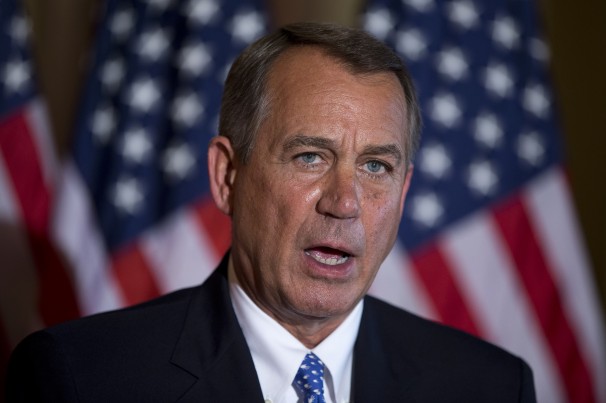Washington: As the government shutdown and the threat of a federal debt default begin to merge into a singular Washington crisis, the only way out for House Speaker John A. Boehner may be something he disparaged earlier this week as “unconditional surrender.”
More than a week into the shutdown and just days before the government is set to exhaust its borrowing authority, Boehner (R-Ohio) and the White House remain at a standoff with no solution in sight.
President Obama has consistently said he will not negotiate until the government reopens and the debt limit is raised.
Most of the political pressure has been on Boehner and his fellow House Republicans to fix the problem, and none of their options are attractive.
But one possible path appears less uncomfortable than others: agreeing to short-term measures to fund the government and raise the debt ceiling with no strings attached to get the policy negotiations for which he has lobbied intensely.
Obama is set to meet with Boehner and his top deputies Thursday. If the talk produces any kind of progress, it will be a departure from every other phone call or face-to-face conversation between the two sides in recent days. Those encounters have served only to reinforce that neither is willing to budge.
But just as the confrontation seemed to reach a crescendo Tuesday, a hopeful note slipped out. Amid an hour-long rhetorical lashing of the GOP during a White House news conference, Obama allowed that he is willing to negotiate with Republicans if they pass “clean” short-term bills to reopen the government and raise the debt ceiling.
“If they can’t do it for a long time, do it for the period of time in which these negotiations are taking place,” he said.
That was slightly new, but at the other end of Pennsylvania Avenue, Boehner wasn’t impressed. “What the president said today was, if there is unconditional surrender by Republicans, he’ll sit down and talk to us,” he told reporters.
What Boehner needs is a solution, and fast, one ideally, that satisfies the fiercely conservative wing of his conference but can also win the support of Obama and the Democratic-led Senate. There are several reasons why short-term bills may be as close as he will come to checking those boxes.
If the speaker were to agree to a short-term — say, six-to-eight-week — debt-ceiling extension and government funding bill, he could sell it to his conservative conference as a chance to get Democrats to the negotiating table on the health-care law and federal spending.
The concessions on reopening the government and raising the debt ceiling would expire at the end of the short-term deal, and Republicans would have the same leverage at the end of the agreement — shutting down the government again or defaulting on debt — as they have today.
Some House Republicans appear to be increasingly open to the idea of a short-term debt deal. And party veterans are trying to push GOP leaders to reach an agreement. Still, there is a shortage of consensus on how to get there.
Boehner has repeatedly called for Democrats to negotiate with him. Democrats have consistently said that they will talk about the issues he wants to discuss only after the government is funded and the debt ceiling is raised. The House has passed three stopgap spending bills leading up to the shutdown that took aim at Obama’s health-care law. The Senate rejected all of them.
That sequence of events has left Boehner in a worse position than he was in at the beginning of the month. Polling shows that Americans blame congressional Republicans more than they do Obama and Democrats for the standoff.
“The speaker would be wise to be for a clean [continuing resolution] but just for a short period,” said Ed Rogers, a longtime Republican strategist. “The half-cocked, delusional crowd knows they have put the GOP in a box. They can and should support this as a way out.”
Still, even if Boehner wanted to, it’s unclear whether he can get most House Republicans to join him. Conservatives are urging him to stand firm.
“Why give [Democrats] a reprieve only to have them demagogue the issue even more with the holidays as a backdrop?” asked Keith Appell, a conservative Republican strategist. “Standing firm has gotten the GOP further than anyone would’ve guessed two months ago.”
The alternative, though, looks potentially bleaker. Obama is not budging. Neither is Senate Majority Leader Harry M. Reid (D-Nev.). If Boehner doesn’t, either, he would be left with a prolonged shutdown that polling shows is causing the GOP the most political harm. And he would have a major stake in the potentially dire consequences of not raising the debt ceiling.
There are no easy answers for Boehner, and there is no endgame that doesn’t involve him absorbing more of the blame. But with the walls closing in and options running out, “surrender” might start to look more like an escape hatch in the coming days.

